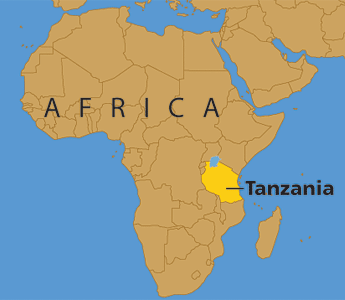Know this before you travel to Tanzania as European

Tanzania, a jewel of East Africa, offers an unparalleled array of experiences, from the vast plains of the Serengeti teeming with wildlife to the pristine beaches of Zanzibar and the majestic peak of Mount Kilimanjaro. For European tourists planning a visit in 2025, a well-informed approach ensures a smoother, safer, and more enjoyable adventure.
1. Visa and Entry Requirements (2025 Updates)
Most European nationalities require a visa to enter Tanzania. The easiest and most recommended method is to obtain an e-Visa online before your travel. This system streamlines the process and avoids potential delays upon arrival.
- e-Visa Application: Visit the official Tanzania Immigration e-Visa portal (eservices.immigration.go.tz/) well in advance (at least 2 weeks before, but ideally longer) to complete the application, upload required documents (passport bio page, recent passport-sized photo, travel itinerary, hotel reservations or invitation letter), and pay the fee (typically around $50 for a single-entry tourist visa). Print a copy of your approved e-Visa to present upon arrival.
- Visa on Arrival (VoA): While still technically available for many nationalities, it is generally not recommended due to potential long queues and delays at the airport.
- East African Tourist Visa: If you plan to combine your trip with visits to Kenya and Rwanda, consider applying for the East African Tourist Visa, which allows multiple entries between these three countries for up to 90 days with a single application.
- Passport Validity: Ensure your passport is valid for at least six months beyond your intended date of departure from Tanzania and has at least two blank pages for stamps.
2. Health and Vaccinations (2025)
Consult your doctor or a travel clinic at least 6-8 weeks before your trip to discuss necessary vaccinations and preventative measures.
- Yellow Fever: A Yellow Fever vaccination certificate is required if you are arriving from, or transiting through, a country with a high risk of Yellow Fever transmission. Most European countries are not considered endemic, but check the latest requirements from your government’s travel advisory or the Tanzanian embassy.
- Recommended Vaccinations:
- Hepatitis A and B
- Typhoid
- Tetanus, Diphtheria, Pertussis (Tdap)
- Measles, Mumps, Rubella (MMR) (ensure you are up-to-date)
- Polio (a booster may be recommended due to global cases)
- Rabies: Recommended for long-term travelers or those with potential animal contact (e.g., wildlife workers).
- Malaria: Malaria is prevalent in many parts of Tanzania, especially coastal areas and lowlands. Consult your doctor about anti-malarial medication. Additionally, use mosquito repellent (containing DEET), wear long sleeves and trousers, especially at dusk and dawn, and sleep under mosquito nets (often provided in lodges).
- Drinking Water: Do not drink tap water. Stick to bottled, filtered, or boiled water. Avoid ice in drinks unless you are sure it’s made from purified water, and peel fruits and vegetables before eating.
- General Hygiene: Practice frequent hand hygiene to prevent common gastrointestinal illnesses.
- COVID-19: While most COVID-19 restrictions have eased, it’s vital to check the latest entry requirements from the Tanzanian Ministry of Health and your own country’s travel advisories closer to your travel date, as policies can change.
3. Currency, Payments, and Budgeting (2025)
The local currency is the Tanzanian Shilling (TZS).
- Foreign Currency Ban: As of March 2025, Tanzania has banned the use of foreign currencies for domestic transactions. All local goods and services must be priced and paid for in Tanzanian Shillings.
- Exchange: Tourists can still use foreign currencies (like Euros or US Dollars) but must exchange them at licensed banks or forex bureaus. It’s advisable to exchange a sufficient amount upon arrival.
- Payment Methods: Credit and debit cards (Visa, MasterCard) are widely accepted in major hotels, lodges, and larger shops, especially in tourist areas. However, cash is essential for smaller purchases, local markets, and in rural areas. Mobile payment systems are also common.
- Budgeting: Tanzania can be a diverse destination in terms of cost. Safaris are a significant expense, while local food and transport are more affordable. Factor in visa fees, park fees (which can be substantial for safaris), accommodation, transport, food, activities, and tips.
4. Safety and Security (2025)
Tanzania is generally considered safe for tourists, especially in popular tourist areas like the Serengeti, Ngorongoro Crater, Kilimanjaro, and Zanzibar. However, like any travel destination, awareness and precautions are key.
- Petty Crime: Be mindful of petty crime like pickpocketing and bag snatching, particularly in crowded urban areas (Dar es Salaam, Arusha, Stone Town) and public transport hubs. Avoid displaying valuables openly.
- Night Safety: Avoid walking alone on beaches or in dimly lit areas at night. Use reputable taxis or hotel-recommended transport services.
- Valuables: Keep valuables in your hotel safe. Only carry necessary cash and essentials in a secure bag.
- Travel Advisories: Stay informed by checking travel advisories from your respective government (e.g., UK Foreign, Commonwealth & Development Office; German Federal Foreign Office) before and during your trip.
- Road Safety: Road conditions vary. If self-driving, consider a 4×4 and avoid night driving due to poor lighting and wildlife. Public transport like dala-dalas (minibuses) can be crowded and may lack safety standards; registered taxis are a safer option.
- Safari Safety: Always follow your guide’s instructions during game drives. Never exit the vehicle without permission and respect wildlife.
5. Cultural Etiquette and Local Interactions
Tanzania is a culturally rich country with over 120 ethnic groups. Respecting local customs enhances your experience.
- Dress Modestly: Tanzania is generally conservative, especially in rural areas and Zanzibar (which has a predominantly Muslim population). When visiting villages, markets, or religious sites, women should cover their shoulders and knees, and men should avoid wearing shorts. Beachwear is acceptable at resorts and by the sea, but cover up when leaving these areas.
- Greetings: Greetings are highly valued. A simple “Jambo” (Hello) or “Habari” (How are you?) goes a long way. Handshakes are customary, always using your right hand.
- Photography: Always ask for permission before taking photos of people, especially in rural areas. Some cultures have beliefs about photography. Never photograph government buildings, military sites, or airports.
- Right Hand: Use your right hand when eating, giving, or receiving items, as the left hand is often considered unclean.
- Bargaining: When shopping in local markets for souvenirs, polite bargaining is expected and part of the cultural experience.
- Respect for Elders: Show respect to elders; “Shikamoo” is a traditional greeting for older people.
- Gifts to Children: Avoid giving money, sweets, or gifts directly to children, as it can encourage begging. If you wish to help, donate to reputable local schools or community projects.
6. What to Pack
- Safari Attire: Neutral-colored clothing (khaki, olive, brown, grey) to blend in with the environment and avoid startling animals. Long sleeves and trousers for sun protection and mosquito prevention. A wide-brimmed hat, sunglasses.
- Layers: Temperatures can vary significantly between day and night, especially in safari parks. Pack layers.
- Comfortable Walking Shoes: Essential for safaris, town exploration, and any hiking.
- Rain Gear: A light rain jacket, especially if traveling during the short or long rainy seasons.
- Swimwear: For Zanzibar beaches or lodge pools.
- Toiletries: While hotels provide some, carry your preferred brands, especially for sunscreens and insect repellents.
- First-Aid Kit: Basic medications for common ailments, motion sickness, rehydration salts, and any personal prescription medications.
- Power Adapter: Type G (UK plug) is common.
- Binoculars and Camera: Indispensable for wildlife viewing.
- Portable Power Bank: For charging devices on the go.
7. Best Time to Visit (2025)
Tanzania’s diverse climate allows for year-round visits, but the “best” time depends on your priorities:
- Dry Season (June to October): Ideal for safaris. Wildlife concentrates around dwindling water sources, making sightings easier. This period also coincides with the Great Migration river crossings in the Serengeti (July to September). Excellent for trekking Kilimanjaro.
- Short Rains (November to December): Less crowded, lush green landscapes, excellent for birdwatching. Still good for safaris.
- Calving Season (January to February): In the southern Serengeti, millions of wildebeest calves are born, attracting predators. A spectacular time for wildlife photography.
- Long Rains (March to May): Low season, fewer crowds, lower prices. Some roads may be challenging, and wildlife dispersal makes sightings less predictable, but it’s great for birding and seeing a greener landscape.
By keeping these points in mind, European tourists can confidently embark on an unforgettable adventure through Tanzania’s breathtaking landscapes and vibrant cultures in 2025.
Source: Thepressradio.com





